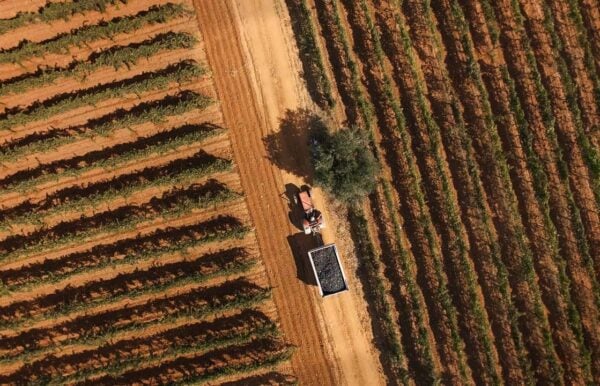The activities of the Cantine Settesoli agricultural cooperative, registered in the Agrigento Chamber of Commerce (CCIAA) register, are chiefly as follows:
The rational processing of grapes from vineyards to enhance the products and generate as much economic benefit for our members as possible.
The sale of the company’s wines and products.
The use and sale of winemaking by-products and their concession to the cooperative’s factories that use the same by-products in their production processes.
The bottling and sale of wine products produced by the cooperative, which are labelled under the company name, also with the acronyms C.SS (Cantina Sociale Settesoli), C.S. (Cantine Settesoli), S.M. (Settesoli Menfi), Coop. S. (Cooperativa Settesoli), and C.S.M.(Cantine Settesoli Menfi).
Distribution of the net sales profits to the members.
Advising and prepping members on the assigned products.
The establishment of special member services for the supply of raw materials, essential vehicles, and the necessary agricultural machinery and tools for cultivating their crops.
To provide technical assistance to members to improve the viticulture sector within their home territory.
The bottling and sale of wines produced by the cooperative.
To use the money paid by its members to self-finance the cooperative in accordance with the laws in force and any other provisions foreseen in Article 2 of the Articles of Association.
To generate consumer appeal and enable people to discover the brand’s universe of products, all of the company teams plan, develop, communicate, promote and sell products and tools that fully embody the cooperative’s corporate spirit, and reflect our values of excellence, creativity and innovation. This ensures a good international reputation and helps maintain solid client relations.
An exceptional universe
Different voices and faces, one vision
“I have two children and I want to give them the opportunity to live in a healthy environment, so they can wander freely amidst the vines, eat the grapes directly from the plant, play in the grass, and gather herbs from the woods. By dedicating our lives to winegrowing and being part of the Cantine Settesoli group, we have made a decision that starts, first and foremost, with ourselves and the way we live the environment, which inevitably spills out into our work”.
Maria Antonietta, winegrower at Cantine Settesoli
“Cooperation is a model that also supports and engages the new generations in a modern rural context and labour system. And, this cooperative, private-sector model, founded on the ethos of a company with healthy principles of solidarity, is an excellent example of territorial development”.
Giuseppe, young winegrower at Cantine Settesoli
“We are pioneers of new management techniques. We adopt organic, conservative pruning methods, while still standing by tradition. Working in the vineyard not only means looking after the vines, it also requires research and innovation; attention to every single type of vine and its natural habitat. As a longstanding member of the Settesoli winery, I am also very aware of the changing times and the need to innovate to produce quality”.
Antonino, winegrower at Cantine Settesoli
Training programmes for employees and collaborators
Cantine Settesoli runs a structured annual programme of training initiatives, aimed not only at employees but all our collaborators and internal teams. In fact, the HR office programmes a regular staff training calendar run by external experts and professors, orientated towards updating and furthering the development of our personnel.
The following is a list of some of our main employee training initiatives.
Labelling & packaging: environmental communication
Team building & time management – MODULE 1-2
Corporate competitivity, innovations in human resources, employment and development - Selecting grapes
Tools for organisational well-being - Coping techniques
Corporate competitivity, innovations in human resources, employment and development - Communication styles
Corporate competitivity, innovations in human resources, employment and development - Facing change
Corporate competitivity, innovations in human resources, employment and development - Ripening and harvesting
Sustainable management – Energy and Environment - Labelling and packaging: product and environmental communication choices
Sustainable management – Energy and Environment - Energy diagnosis – Certification and energy management systems
Sustainable management – Energy and Environment - Environmental impact: Criteria, evaluation and containment procedures
Sustainable management – Energy and Environment - Traceability and management of production waste and wastewater
Sustainable management – Energy and Environment - The environmental programme
Sustainable management – Energy and Environment - Environmental management in the winemaking sector
Sustainable management – Energy and Environment - Environmental damage: “The polluter pays”
Sustainable management – Energy and Environment - UNI EN ISO 14001:2015 Regulations
Corporate competitivity, innovations in human resources, employment and development - Resilience and coping techniques
Technical aspects and new technologies - Vinification & sparkling wines
Quality production: product and process certification
Sensorial analysis
Advanced Excel cours 1-2
Workers safety representative update - RLS
Prevention and protection service officer - ASPP
Food suppliers basic training cat. B
Prevention and protection service manager - RSPP
First-aid
Fire safety manager
Neighbouring areas
Agricultural tractor drivers
PEI - PES - PAV electric switchboard operators
BLDS – Basic Life Support: Defibrillation
Forklift truck operators
Privacy
Using lift platforms with and without stabilisers
Assembling/disassembling scaffolding
Specific employee training on health & safety in the workplace
Viticulture training programme for members
Managed by a team of agronomists, Cantine Settesoli’s viticulture office provides technical assistance to our members, monitors the vineyards and develops initiatives aimed at improving the quality of the grapes.
The offices activities, which are designed for member winegrowers, are carried out in the following stages:
Vine pruning stage (december-february): technical training sessions, assistance and consultancy in the field on how to correctly prune the vines according to the variety and development stage of the plant.
Vine growing stage (march-june): technical training sessions on Green management, plant protection, irrigation, assistance and consultancy in the field on the evaluation, prevention and cure of vine diseases.
Grape ripening stage (july-september): assistance and consultancy in the field on sampling the grapes, and the relative sugar content, PH and acidity analyses.
Post-harvest stage (october-november): technical training sessions, assistance and consultancy in the field on new systems, deep tillage and sowing.
Internships
Cantine Settesoli helps young people into the world of work. In fact, since 2011, the company has been running both curricular and extracurricular internships and apprenticeships within various company departments, providing over 200 vocational placements to date. The objective is to enable young people to acquire work experience through practical training that allows them to directly test their skills in the field.
In the case of a an educational, curriculum-based internship, the trainee must be enrolled on a study course. In the case of an extracurricular internship, generally speaking and with the exception of specific cases, the trainee will require a valid DID (Declaration of Immediate Availability to Work) or document issued by the Italian employment centre, confirming that the trainee is unemployed. The application for an internship involves three parties: the intern, or apprentice, the company and the promoting body (master, university, school, or a third party that has the role of supervising and guaranteeing the smooth operation of the employment scheme).
The company and the relevant promoting body must nominate a tutor. The same tutor will supervise the internship at the company, while the company tutor will provide training, flanking the trainee on their educational course. The internship is regulated by an internship contract, undersigned by all of the parties involved, and will be agreed in accordance with the regulations in force in the Sicily Region. Once the contract has been drafted and signed, the host company must confirm they have activated the internship by sending an obligatory confirmation online via the regional portal of the Sicily Regional Council (Regione Sicilia).





